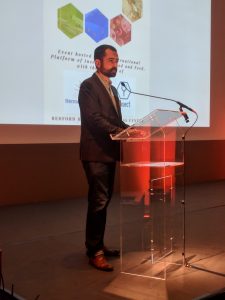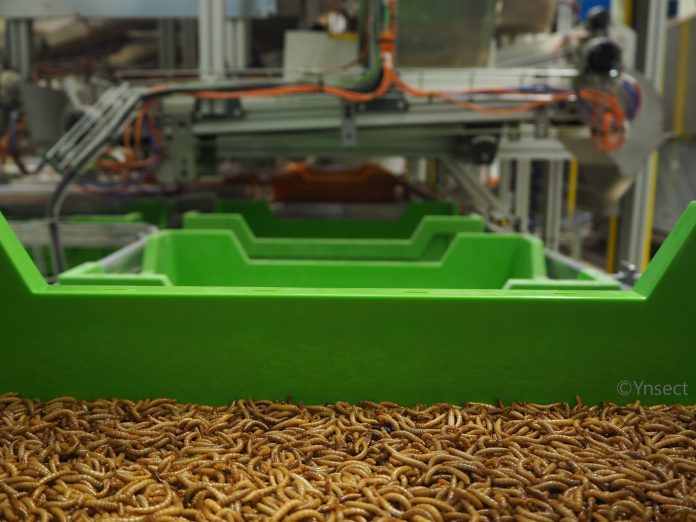European Interest discuss with Antoine Hubert (CEO of French biotech company Ynsect and President of the International Platform of Insects for Food and Feed – IPIFF) and Mr Christophe Derrien (IPIFF Secretary-General) about the insect industry and market in the EU
Are Europeans ready and willing to eat products made from insects? What about gulping down a whole bug for lunch? While this question may seem strange and come as a surprise for many, insects are actually edible and part of a new emerging global food chain bringing together farmers, retailers and restaurateurs.
The main reason to think about insects as food is because the increase in the global population represents a major food security concern. Not only is there a need for more proteins, there’s also a need to reduce emissions that deteriorate climate leads to alternative protein sources. Edible insects emerge as a viable olutions since they provide human diets with high value proteins and can also reduce animal proteins in animal feed.
Although insect farms entered the EU some 10 years ago, the entire insect sector from farms to the market is faced with several obstacles relating to legislation, cultural habits and market behaviour.
European Interest caught up with Mr. Antoine Hubert (CEO of French biotech company Ynsect and President of the International Platform of Insects for Food and Feed – IPIFF) and Mr. Christophe Derrien (IPIFF Secretary-General) to discuss the benefits and challenges of the insect food industry in the EU as well as the role the insect sector is playing as regards recycling food waste. IPIFF is an EU non-profit organisation representing the insect production sector towards EU institutions. Created in 2012, the association is today representing 54 members.
European Interest: The insect market in the EU might be very young, but it is also very dynamic. After all, insect farming is a field for further development of the concept of start-up companies as well as for employing innovative techniques. Do you think EU regulation supporting or obstructing the sector?
Antoine Hubert: The European insect sector is a leader in terms of innovation – with numerous start-up initiatives that gradually became trustworthy actors in the food and feed chains. All these steps would have not been possible in the absence of a supportive EU regulatory framework. A concrete example is the EU authorisation of insect-derived protein in aquaculture feed – which can be incorporated in such products since July 2017. We noticed that unlocking such legislative opportunities is key to making the outputs of insect farming more attractive – in this case, for the aquafeed sector.

“In the animal feed sector, the necessity to investigate alternatives that satisfy the nutritional needs of farmed animals – within the planetary boundaries – played a key role in developing sound scientific evidence that confirms the added value of insects in fish, chicken or pig feed” says Antoine Hubert (CEO of French biotech company Ynsect and President of the International Platform of Insects for Food and Feed – IPIFF), [Photo: IPIFF]
While this approval represented a boost for the sector, we hope that the subsequent authorisation of insect proteins in poultry and swine feed – which is expected soon – will represent a win-win for both insect producers, who will have access to new markets, as well as for European farmers and the animal feed industry, that will be able to rely on more diverse premium ingredients, in line with the nutritional requirements of chickens and pigs, for example.
According to scientific findings, edible insects can serve as a unique source of proteins. Are insect-made proteins suitable for human health? Why choose such a source of protein over traditional sources like meat and fish?
Christophe Derrien: There is growing scientific evidence that confirms the health benefits in both animal feed and human food. In fact, many amino acids that are present in fish or meat can also be found in insects. However, the interesting part is that the proportion of such amino acids in certain insect species can be higher than in other protein-rich types of food – which makes insects a valuable complement to our daily diet. For that reason, people following specialised diets (e.g. flexitarian, paleo, etc.) become more interested in insects and insect-derived products.
Moreover, insects are widely used in certain countries in order to combat nutrient deficiencies – such as anaemia. Numerous species are rich in micronutrients (e.g. vitamins, minerals), prebiotics (e.g. chitin) and antioxidants – playing a key role in reducing deficiencies, while also improving the immunity and metabolic functions of the human body.
Recently, the Secretariat of IPIFF released a factsheet summarising the potential of insects and insect-derived ingredients in food, highlighting the key benefits of incorporating insects in a diversified diet.
How long do you think it will take for edible insects to enter Europeans’ dietary habits? What’s the biggest obstacle? Is it EU legislation or cultural reasons?
Derrien: The diet of Europeans is constantly evolving. We are adapting our habits taking into consideration factors related to taste, health, production methods, as well as environmental footprint. Our sector sees an increasing acceptance from European consumers, who are willing to try insects as an alternative source of proteins – but also as an innovative ingredient in traditional dishes.
‘Numerous species are rich in micronutrients, prebiotics and antioxidants – playing a key role in reducing deficiencies, while also improving the immunity and metabolic functions of the human body’ C. Derrien
For the moment, edible insects are only commercialised in some EU member states. On the European level, we are confident that the market will continue to develop following the authorisation of insects as novel food (i.e. according to the Regulation (EU) No 2015/2283, the placing on the market of insects and their derived products is subject to an EU approval).
The first authorisations for edible insects on the EU market are expected by mid-2020, subsequent to the EFSA opinion foreseen in the following months.
Insect farms recycle food and farm waste turning it into protein. Are these environmental benefits recognised today on a large scale in Europe?
Hubert: That is an interesting question – we see information on social media regarding the potential of insects to recycle food waste (an ability which cannot be questioned) into valuable products. However, in the European Union, farmed insects fall under the category of ‘farmed animals’, which means that the products insects feed on have to comply with the EU feed standards – like any other type of animal feed. Notably, insects may only be fed with materials of vegetal origin or milk, eggs (and their derived products) – not with food waste. Presently, IPIFF members rely on food and farm by-products – secondary materials that are unused or underutilised and that are subsequently transformed into protein, lipids and fertiliser (insect dejecta, known as ‘frass’). Therefore, insect farms become a new link in the agri-food chain, revalorising such products and reintroducing precious nutrients into the food chains.
When it comes to environmental benefits, we see growing awareness from numerous actors.
In the animal feed sector, the necessity to investigate alternatives that satisfy the nutritional needs of farmed animals – within the planetary boundaries – played a key role in developing sound scientific evidence that confirms the added value of insects in fish, chicken or pig feed. One of the recognised advantages of insects is that they require little resources (such as land, water, etc.), providing nutritious outputs that can be incorporated in the diet of farmed animals.
‘The European insect sector is a leader in terms of innovation – with numerous start-up initiatives that gradually became trustworthy actors in the food and feed chains’ – A.Hubert
Derrien: For example, in a recent report published by Barclays, it is stated that the expansion of agriculture by 2050 would require land equivalent to two times the size of India. This clearly shows the urgency to develop alternative farming methods – that shall address the growing demand for food. According to our members’ estimations, the production of insect protein in Europe will prove to be beneficial in reducing the imports of high-protein feed materials – saving an area the size of Belgium by 2030 (source – IPIFF Vision Paper). Of course, these estimations rely on current production practices and methods – further research and innovations will help us to develop more optimised and efficient processes.
A few weeks ago the International Platform of Insects for Food and Feed (IPIFF) organised its General Assembly. What are the major achievements of the association until now? Which goals should be set for the upcoming period?
Hubert:The General Assembly was the final internal event of our association in 2019 – a reason to speak about successes, but also to try to improve on certain aspects. The day after, we also organised an International Conference focusing on the research priorities of the European insect sector – an opportunity to launch our latest publication, entitled ‘Building bridges between the insect production chain, research and policymakers’. The document was presented in front of more than 130 actors active in the insect production value chains, ranging from producers to researchers and policymakers. The key message of the event was that future research initiatives should be developed in harmony with the regulatory calendar of the sector and markets’ needs – we believe that this is highly relevant, considering the ongoing discussions on the future architecture of the Horizon Europe Research and Innovation Programme.
Since its establishment in 2012, IPIFF – the umbrella association representing European insect producers in Brussels – had notable achievements. We are, firstly, recognised as the main interlocutor of the European policymakers on matters related to insect farming. This placed IPIFF in a privileged position – bridging the gap between the European institutions and insect farming realities. Even if we are formed of more than 50 member organisations, IPIFF wishes to be a representative actor for the entire European insect sector – helping the industry to develop step by step. To this end, our website offers a wide range of IPIFF publications, that are freely accessible and prove to be of great help for both new initiatives, as well as well-established insect businesses.
From a regulatory perspective, one of the major achievements was the authorisation of insect proteins in aquaculture in 2017. Presently, more than half of the insect-derived ingredients are used by the aquafeed market – and this expected to grow in the near future.

“Our sector sees an increasing acceptance from European consumers, who are willing to try insects as an alternative source of proteins – but also as an innovative ingredient in traditional dishes” says Christophe Derrien (IPIFF Secretary-General). [Photo: IPIFF]
Our goals have been recently listed in our revised Vision Paper (page 12). On the one hand, we wish to make sure that our sector can contribute to the development of new feed formulations in poultry and swine feed – we expect that the approval of insect proteins in such products will follow during 2020. Concurrently, we also aim at improving the circularity potential of European insect farming, by incorporating more products no longer considered suitable for human consumption due to technical defects or goods after the sell by date – also known as ‘former foodstuffs’ (e.g. bread, breakfast cereals, biscuits, pasta, chocolate, etc.). While many of these food items are, most of the time, thrown in the garbage bin and later incinerated, other similar food items (e.g. products containing meat and fish, such as pizza, lasagna, etc.) cannot be used as animal feed. The bioconversion of such products – through insect farming – will also address a European and global challenge: food waste.

